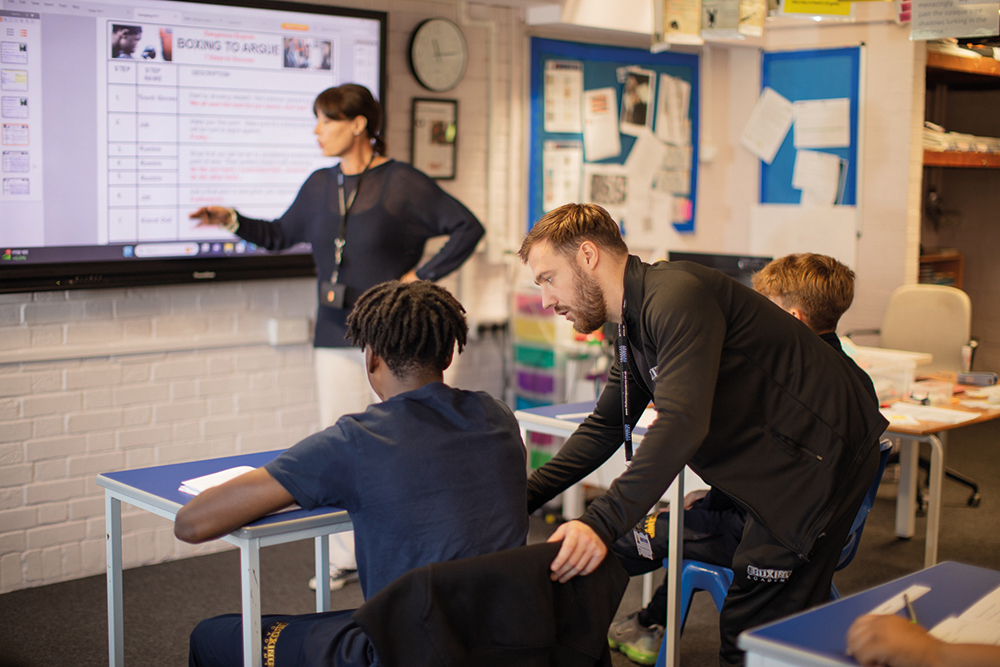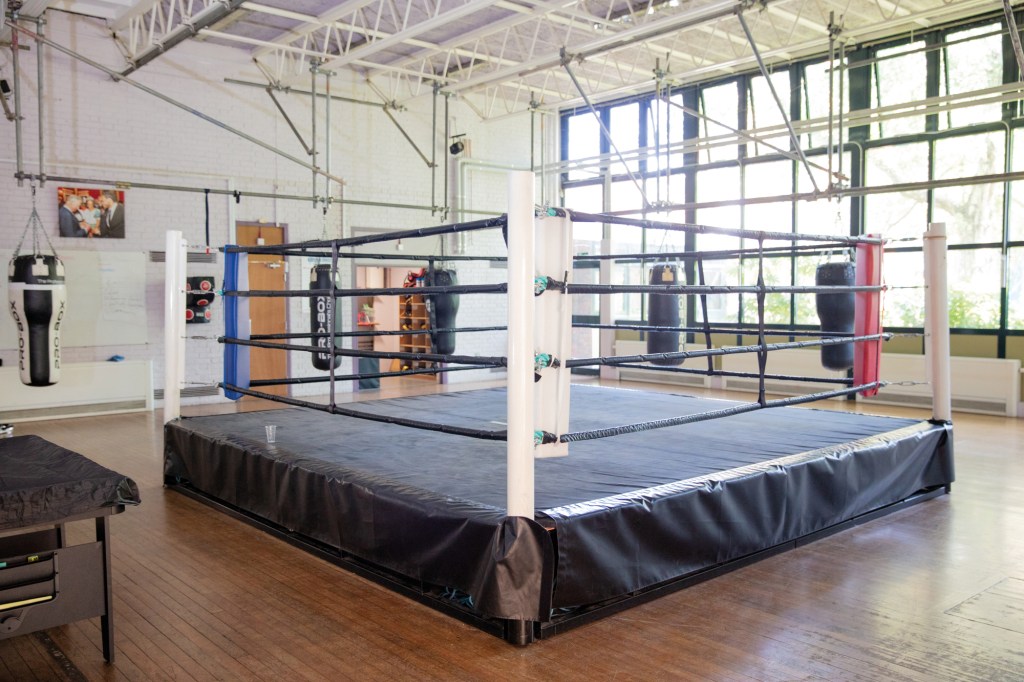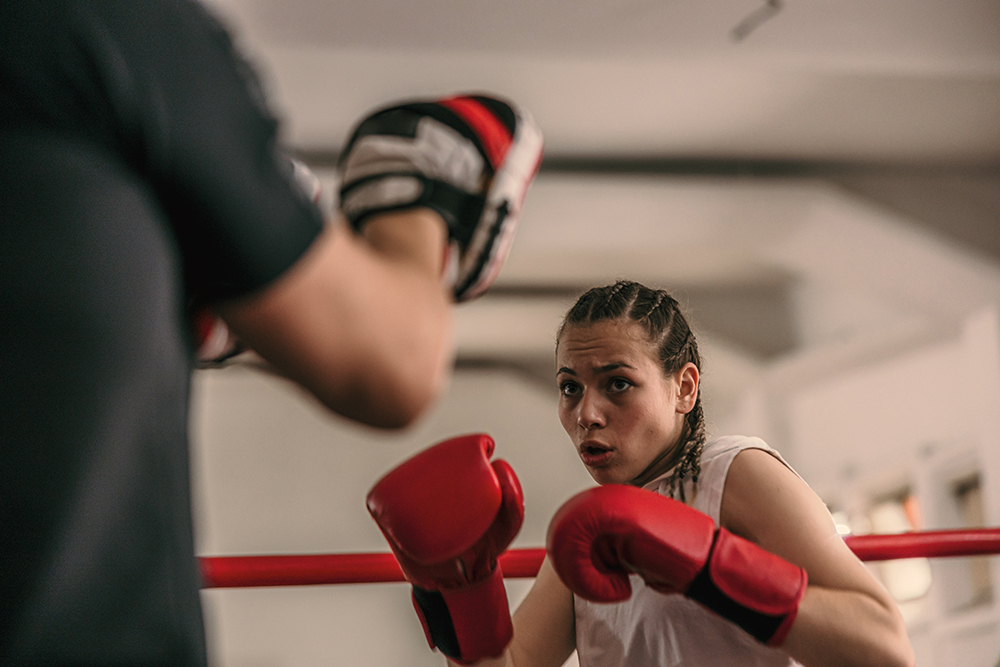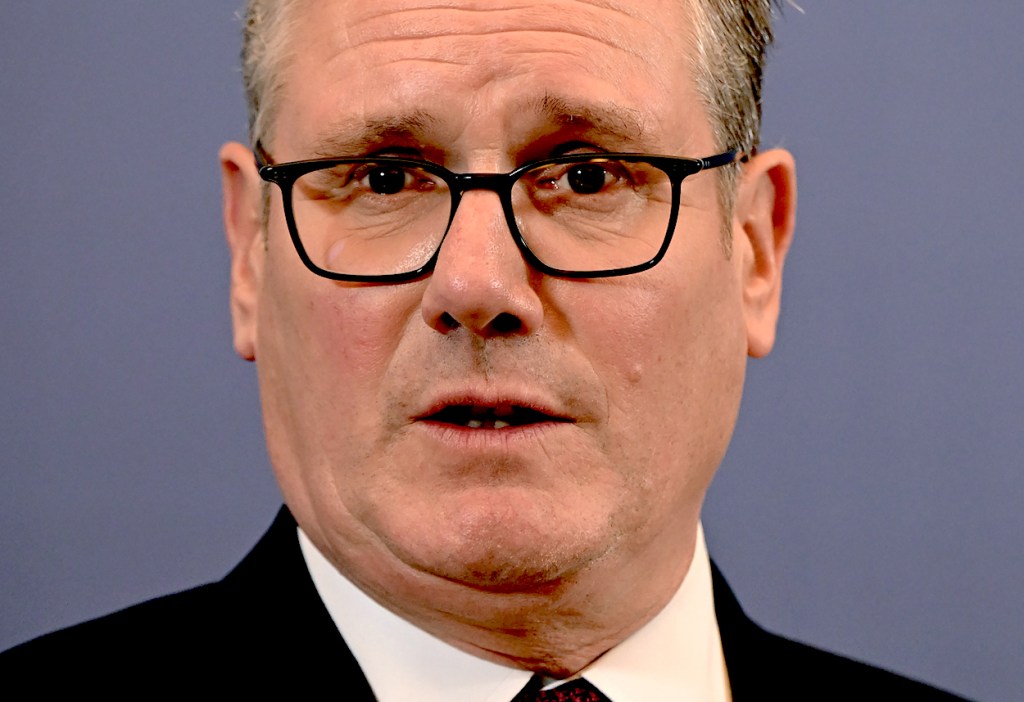Max Jeffery has narrated this article for you to listen to.
It’s a typical morning at the Boxing Academy in east London. In the reception, men with handheld metal detectors pat down students, confiscating their belongings and mobile phones for the day. A child has emptied out his pockets and is holding a mucky plastic dental retainer. ‘Can he have this?’ one man with a metal detector asks another. With suspicion, it is permitted.
The Boxing Academy is an alternative provision secondary school in Hackney, founded in 2007 on the experimental idea that you could better teach difficult children by making boxing a central part of their education. Students take daily boxing classes, wear navy tracksuits and are as disciplined as boxers would be. At the entrance to the school, an A4 sign is pinned prominently to a wall:
PUNCTUALITY PENALTIES
After 9.45 a.m.: 50 push-ups
After 10.00 a.m.: 100 push-ups
After 10.15 a.m.: 150 push-ups
I’m watching the morning shakedown and reading the penalty notice when the school’s headteacher Anna Cain sails in. Short silver hair, flared jeans, rollneck jumper, blazer. She scans a pass and takes me down a corridor and into her small office where we sit. She begins by explaining why the children box.
‘The reason it’s a boxing academy is – as anyone who’s ever joined a boxing gym knows – it’s like having a second family,’ she says. ‘That level of support and belonging, that’s what we’re trying to do here. They start out not knowing anything. And they learn jabs, footwork, all the basics, which are actually very complicated. You can hit something hard, but if you want to really hit something hard you’ve got to learn the technique. That repetitive nature of learning – the discipline, making mistakes, laughing about it, carrying on – they use that as an example to take into English and maths.’
The 48 students here – there are eight classes of six – are some of the toughest to teach in London. All were once at mainstream schools, but for some reason or other, it didn’t work out. Many have special needs; most come from hard backgrounds. The kids are aged 11 to 16, and alongside their daily 45-minute boxing session, they study a stripped-down curriculum of English, maths, science, art and PE.
‘They’ve worked out that if you want to get out of doing something, behave badly. Our job is to break that cycle’
‘I’ve got so much time for these what we used to call “naughty kids”,’ Anna says. ‘They’ve worked out that if you want to get out of doing something, behave badly. Our job is to break that cycle.’
Boxing teaches good values, the pared-back syllabus improves focus, and a commitment to discipline improves behaviour. Instead of daydreaming through after-school detentions, badly behaved pupils are punished with push-ups or ordered to clean the gym. Even small infractions of the school’s standards have repercussions: 50 push-ups for ‘low trousers’; 25 for ‘use of street language’. ‘I used to get 500 push-ups a day,’ says one pupil, remembering a former teacher. ‘One teacher got a bit crazy with the push-ups,’ Anna admits.
Children at the Boxing Academy are strictly disciplined, but are also counselled through poor conduct with what the school calls their ‘pod leader’. They’re a kind of mentor or, as pupils call them, ‘a professional big brother’. There is one pod leader per class, and they sit with the students in every lesson: while the teacher delivers the curriculum, the pod leader manages behaviour.
‘If there is an incident with a teacher or another student, the pod leader will stand outside and have a quick chat with the pupil,’ Anna says. ‘They’ll try to unpick it. If children are in a “big school”, as we call it, say a kid gets into trouble, they get a couple of days’ suspension. They come back in afterwards and you sit down and you have a meeting. Two days later for a teenager to talk about something they got wrong is absolutely pointless. There is no way that whatever you do to unpick it is going to land with them effectively.’ The school also has a resident psychologist, who explains to the children the neurology of their outbursts.
We leave Anna’s office for a tour. The Boxing Academy is currently in a temporary building while a permanent site is being built down the road. In today’s incarnation, the school’s squat structure is constituted around the gym, in the centre of which is a full-sized boxing ring. On the walls are motivational quotes from Muhammad Ali and Mike Tyson. ‘Everyone has a plan until they get punched in the mouth,’ reads one from Iron Mike.

I meet Jermaine Williams, the vice principal, who runs the boxing curriculum at the academy. We stand at the side of the ring as a group of kids work heavy bags. It feels very calm and normal. Over regular thudding, Jermaine tells me how he wound up here.
He arrived in the UK for a two-week holiday and never went back. ‘I came over from Jamaica at the age of 12,’ he says. ‘At 16 the Home Office said I needed to make arrangements to go back to Jamaica. I was living with my aunt at the time and she said she didn’t know what to do. So I was in limbo. I started following the wrong crowd, just up to no good.’ Jermaine was arrested and spent three months in Feltham prison, near Hounslow, before taking up boxing.
‘I went into the gym and challenged the coach,’ he remembers. ‘I was like, “Come on, I’m doing street-fighting, I’ve been on the street, I’m a street kid, I can take you”. And the coach was like, “Come in the ring”, so I finally got in the ring and everyone was watching and I said “Watch me knock this coach out”. He put the gloves on, we got in and I gave him everything I had. I laid into him. He just walked through it and then just went doof, in my body. My soul left me. I was like… I need to learn that.’
Jermaine eventually settled his case with the Home Office, got indefinite leave to remain and became a British citizen. ‘What I try to do here is give the students a little bit about my background, because every one of these young faces that you see, they are going through their trials and tribulations,’ he says. ‘As mentors we try to use our experience to help them through that period, because no one necessarily did that for us.’

I meet a Year 11 student, Anthony, back in Anna’s office. He was once at Stoke Newington School, not far from here, but was excluded in Year 8 and sent to the Boxing Academy for fighting too much, which is a little ironic. How does it compare? ‘It feels like jail,’ he says. ‘But it’s a nice school and everything. People understand you more. There’s less people so you can get less distracted and all that.’
Another pupil, Megan, in Year 10, says she attended three other schools before ending up at the Boxing Academy: ‘I got kicked out of mainstream in Year 7. Then I went to a [pupil referral] unit. Then another mainstream. The last mainstream wasn’t that bad. I just didn’t like the rules. I used to get angry over everything. I was just a menace.’
‘I can’t bunk here. Am I going to bunk in a toilet? You can’t have your phone, nothing’
She says the discipline at the Boxing Academy works: ‘If something happens, they’ll try to deal with it the same day. Sometimes in mainstream they’ll just leave it and then everything will go out of proportion. But here they will try to deal with it the same day so we can just go back to normal. I mean, this is a small building, so obviously less people, and there’s less stuff you can do. I can’t bunk here. Am I going to bunk in a toilet? You can’t have your phone, nothing. I used to love bunking.’
A few weeks ago Ofsted visited the Boxing Academy. It is expected to rate it ‘outstanding’ in every field. Anna tells me that she wants to use the momentum behind the project to widen the curriculum, open a sixth form, perhaps create franchises across the UK. ‘I am properly cautious about making sure we don’t get this wrong, because I think that would be heartbreaking,’ she says. Her staff are pushing her to open residential spaces so some of the kids can get away from their difficult home lives.
All of Anna’s plans depend on how Labour decides to treat academies and free schools. Reports say that the government wants to restrict their freedoms to teach outside the national curriculum, and that they might give councils more power to govern how schools like the Boxing Academy are run. ‘We don’t know what happens next,’ Anna says. ‘I don’t think any schools do.’
Some names have been changed.







Comments